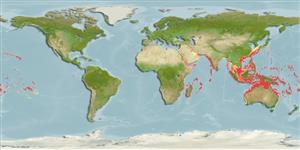Common names from other countries
Environment: milieu / climate zone / depth range / distribution range
Ecology
Marine; reef-associated; depth range 0 - 170 m (Ref. 89972). Tropical; 30°N - 32°S
Indo-Pacific: East Africa to the Hawaiian, Marquesan, and Ducie islands, north to southern Japan, south to Lord Howe and Rapa islands. Southeast Atlantic: East London, South Africa (Ref. 5372).
Size / Weight / Age
Maturity: Lm ? range ? - ? cm
Max length : 20.0 cm TL male/unsexed; (Ref. 9710); max. reported age: 9 years (Ref. 72479)
Nocturnal species that is usually in pairs or small groups in shallow reef flats of lagoon and seaward reefs to depths of over 30 m. Juvenile occurs among rocks of inner reef flats and in tide pools (Ref. 205). Benthopelagic (Ref. 58302). Adult feeds mainly on nudibranchs, tubeworm tentacles, and other benthic invertebrates, also feeds on algae and coral polyps. Oviparous (Ref. 205). Forms pairs during breeding (Ref. 205).
Life cycle and mating behavior
Maturities | Reproduction | Spawnings | Egg(s) | Fecundities | Larvae
Distinct pairing (Ref. 205). Monogamous mating is observed as both obligate and social (Ref. 52884).
Heemstra, P.C., 1986. Chaetodontidae. p. 627-632. In M.M. Smith and P.C. Heemstra (eds.) Smiths' sea fishes. Springer-Verlag, Berlin. (Ref. 5372)
IUCN Red List Status (Ref. 130435)
CITES (Ref. 128078)
Not Evaluated
Threat to humans
Harmless
Human uses
Fisheries: minor commercial; aquarium: commercial
Tools
Special reports
Download XML
Internet sources
Estimates based on models
Preferred temperature (Ref.
115969): 23.7 - 29, mean 27.7 (based on 1986 cells).
Phylogenetic diversity index (Ref.
82804): PD
50 = 0.5000 [Uniqueness, from 0.5 = low to 2.0 = high].
Bayesian length-weight: a=0.02291 (0.01133 - 0.04632), b=3.00 (2.83 - 3.17), in cm Total Length, based on LWR estimates for this Genus-body shape (Ref.
93245).
Trophic level (Ref.
69278): 3.7 ±0.1 se; based on diet studies.
Resilience (Ref.
120179): High, minimum population doubling time less than 15 months (Preliminary K or Fecundity.).
Fishing Vulnerability (Ref.
59153): Low vulnerability (10 of 100).
